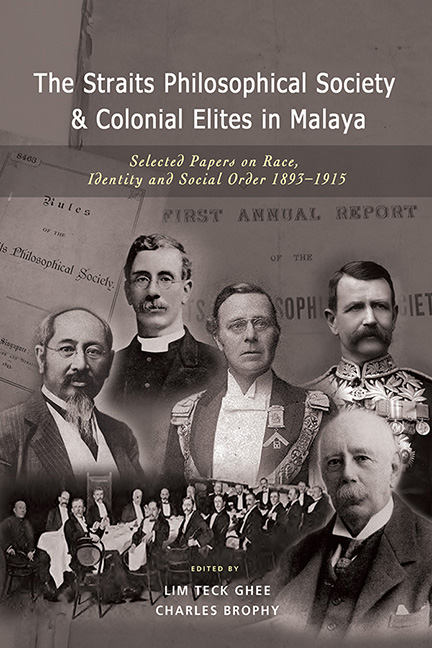 The Straits Philosophical Society and Colonial Elites in Malaya
The Straits Philosophical Society and Colonial Elites in Malaya Published online by Cambridge University Press: 09 January 2024
Editors’ Note
W.R. Collyer was a prominent lawyer and jurist who had earlier served in Sierra Leone, Gold Coast and Cyprus before arriving in the Straits Settlements in 1892. In 1903 he was serving as the Attorney General when he provided the introductory address as the President of the Society. His address took up a question central to the history and development of the colony—the application of law to Europeans. In the early days, according to Collyer, it could be said that Europeans in the colony were “amenable to no authority in the place”. This produced a contradiction between the equality before the law proclaimed by Raffles and the double-standards between Europeans and Asians which emerged in practice. The transfer of the colony to the Crown meant for Collyer that the present contradiction was no longer between Europeans and Asians, but was now between the interests of business and that of legal order. Giving the example of the then recent curtailment of the jury system in the interests of traders he argued that this policy was creating an opposition between civic duty and the pursuit of business. It also raised the question of whether the colony was simply a place to make money or a place in which the legal order had intrinsic value. In his opinion this in turn expressed the nature of colonial society in the Straits Settlements.
For my subject tonight I am indebted to Mr. Buckley’s Anecdotal History of Singapore. Of course you have all seen the book, and I suppose many of you must have read it. It is a very wonderful storehouse of facts, and tells the history of Singapore in an original manner. It is kaleidoscopic in its variety, the events jostling one another as they do in an unselected and unedited diary. It depends on no attraction of style, and no artificial allurements of typography or “get-up”, but simply on the enthusiasm and loving research which the author has bestowed on his work.
To save this book to your Kindle, first ensure [email protected] is added to your Approved Personal Document E-mail List under your Personal Document Settings on the Manage Your Content and Devices page of your Amazon account. Then enter the ‘name’ part of your Kindle email address below. Find out more about saving to your Kindle.
Note you can select to save to either the @free.kindle.com or @kindle.com variations. ‘@free.kindle.com’ emails are free but can only be saved to your device when it is connected to wi-fi. ‘@kindle.com’ emails can be delivered even when you are not connected to wi-fi, but note that service fees apply.
Find out more about the Kindle Personal Document Service.
To save content items to your account, please confirm that you agree to abide by our usage policies. If this is the first time you use this feature, you will be asked to authorise Cambridge Core to connect with your account. Find out more about saving content to Dropbox.
To save content items to your account, please confirm that you agree to abide by our usage policies. If this is the first time you use this feature, you will be asked to authorise Cambridge Core to connect with your account. Find out more about saving content to Google Drive.